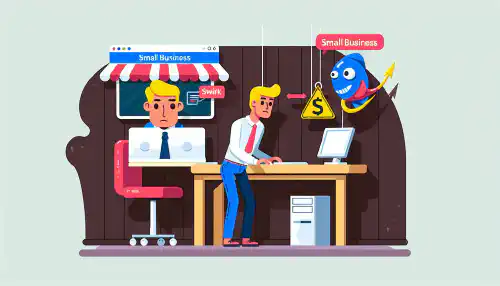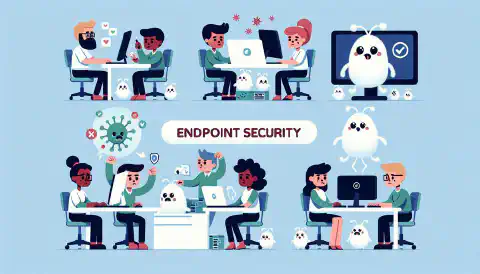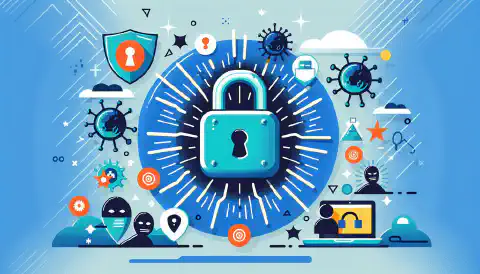Shield Your Business: Definitive Guide to Small Business Phishing Protection Strategies

Table of Contents
How to Protect Your Small Business from Phishing Scams
Phishing scams have become a major threat to small businesses, with cybercriminals constantly finding new ways to deceive and exploit unsuspecting individuals. It is crucial for small business owners to understand the different types of phishing scams and how to protect their businesses from falling victim to these attacks. This article provides valuable insights and practical tips on how to safeguard your small business from phishing scams.
Key Takeaways
- Educate your employees about phishing and how to recognize phishing attempts.
- Implement email security measures such as spam filters and email authentication protocols.
- Use multi-factor authentication to add an extra layer of security to your business accounts.
- Report any phishing attempts to the appropriate authorities and your IT department.
- Regularly update your security policies and conduct security audits to stay ahead of phishing trends.
Understanding Phishing Scams
What is Phishing?
Phishing is a type of cyber attack where attackers impersonate legitimate organizations or individuals to deceive victims into providing sensitive information, such as passwords, credit card numbers, or social security numbers. It typically involves sending fraudulent emails or creating fake websites that appear to be from trusted sources. Phishing attacks can also be carried out through phone calls or text messages, known as vishing and smishing, respectively.
- Phishing is a form of social engineering that exploits human psychology and trust.
- Attackers often use urgent or enticing language to manipulate victims into taking immediate action.
- Phishing emails may contain links to malicious websites or attachments that install malware on the victim’s device.
- Phishing attacks can target individuals or organizations of any size, including small businesses.
- Small businesses are attractive targets for phishing scams due to their limited resources and potentially valuable data.
Types of Phishing Scams
Phishing scams come in various forms and utilize different techniques to deceive individuals and organizations. It is essential for small businesses to be aware of these common phishing tactics and take necessary precautions to protect themselves.
Common Targets of Phishing Scams
Phishing scams can target a wide range of individuals and organizations, with cybercriminals constantly adapting their tactics to exploit vulnerabilities. Small businesses are particularly vulnerable to phishing attacks due to limited resources and a lack of robust cybersecurity measures. It is crucial for small business owners and employees to be aware of the common targets of phishing scams and take proactive steps to protect themselves.
1. Employees: Phishing attacks often target employees of small businesses, as they can be seen as the weakest link in the security chain. Cybercriminals may impersonate company executives or IT personnel to trick employees into revealing sensitive information or downloading malicious attachments.
2. Customers: Phishing scams may also target customers of small businesses, aiming to steal their personal and financial information. Cybercriminals may send fraudulent emails or create fake websites that mimic legitimate businesses to deceive customers into providing their confidential data.
3. Vendors and Partners: Small businesses often collaborate with vendors and partners, making them potential targets for phishing scams. Cybercriminals may impersonate trusted vendors or partners to gain access to sensitive information or initiate fraudulent transactions.
To effectively protect against phishing scams, small businesses should prioritize employee education, implement robust email security measures, and utilize multi-factor authentication. By staying vigilant and proactive, small businesses can minimize the risk of falling victim to phishing attacks.
Recognizing Phishing Attempts

Signs of a Phishing Email
Phishing emails are a common method used by cybercriminals to trick individuals into revealing sensitive information. These emails often appear to be from a legitimate source, such as a bank or a well-known company, and they typically ask for personal information like passwords, credit card numbers, or social security numbers. It’s important to be able to recognize the signs of a phishing email to protect yourself and your small business. Here are some key indicators to look out for:
- Unusual or suspicious email addresses: Phishing emails often come from email addresses that are slightly different from the official domain. Pay attention to misspellings or variations in the sender’s email address.
- Urgent or threatening language: Phishing emails often use fear or urgency to prompt immediate action. They may claim that your account has been compromised or that you need to update your information immediately.
- Requests for personal information : Legitimate organizations will never ask you to provide personal information via email. Be cautious of emails asking for passwords, credit card numbers, or social security numbers.
- Poor grammar or spelling mistakes: Phishing emails often contain grammatical errors or spelling mistakes. This is a red flag that the email may not be legitimate.
It’s important to remember that phishing emails can be very convincing and may even include logos or branding that make them appear legitimate. Always double-check the email address, hover over links before clicking on them, and be cautious of any requests for personal information. If you suspect an email is a phishing attempt, report it to your IT department or the appropriate authorities.
Identifying Phishing Websites
Identifying phishing websites is crucial for protecting your small business from cyber threats. Phishing websites are designed to mimic legitimate websites in order to trick users into providing sensitive information, such as login credentials or financial details. To identify phishing websites, be cautious of the following:
- URL inconsistencies: Check the website’s URL carefully for any misspellings, extra characters, or unusual domain extensions.
- Poor website design: Phishing websites often have poor design quality, including low-resolution images, mismatched fonts, and broken links.
- Suspicious requests for personal information: Be wary of websites that ask for personal information, especially if it seems unnecessary or excessive.
It is important to educate your employees about the dangers of phishing websites and provide them with the necessary tools and knowledge to identify and report suspicious websites. By implementing strong email security measures and regularly updating security policies, you can further protect your business from falling victim to phishing scams.
Social Engineering Tactics
Social engineering tactics are manipulative techniques used by cybercriminals to deceive individuals and gain unauthorized access to sensitive information. These tactics exploit human psychology and rely on the trust and naivety of individuals. It is important for small businesses to be aware of these tactics and take steps to protect themselves. Here are some common social engineering tactics used by phishers:
- Pretexting: Phishers create a false identity or scenario to trick individuals into revealing sensitive information.
- Phishing Emails: Phishers send emails that appear to be from a legitimate source, such as a bank or a trusted organization, to trick individuals into clicking on malicious links or providing personal information.
- Baiting: Phishers offer something enticing, such as a free gift or a special offer, to lure individuals into providing their personal information.
It is crucial for small businesses to educate their employees about these tactics and provide training on how to recognize and respond to them. By implementing strong security measures and promoting a culture of cybersecurity awareness, small businesses can protect themselves from social engineering attacks.
Protecting Your Small Business

Educating Employees about Phishing
As a cybersecurity expert, educating employees about phishing is crucial in protecting your small business from potential attacks. By providing comprehensive training and awareness programs, you can empower your employees to identify and respond to phishing attempts effectively.
To educate your employees about phishing, consider the following strategies:
- Conduct regular training sessions that cover the basics of phishing, including how to recognize suspicious emails, links, and attachments.
- Emphasize the importance of strong and unique passwords to prevent unauthorized access to accounts.
- Teach employees about the dangers of clicking on unknown links or downloading files from untrusted sources.
- Encourage employees to verify the authenticity of emails and websites before sharing sensitive information.
By implementing these educational initiatives, you can significantly reduce the risk of your employees falling victim to phishing scams.
Implementing Email Security Measures
Implementing effective email security measures is crucial for protecting your small business from phishing scams. By taking proactive steps to secure your email communications, you can significantly reduce the risk of falling victim to phishing attempts. Here are some key measures to consider:
Using Multi-Factor Authentication
Multi-factor authentication (MFA) is a crucial security measure for protecting your small business from phishing scams. By requiring users to provide multiple forms of identification, MFA adds an extra layer of defense against unauthorized access. It significantly reduces the risk of compromised accounts and helps prevent phishing attacks. Here are some key points to consider when implementing MFA:
Responding to Phishing Incidents

Reporting Phishing Attempts
When it comes to reporting phishing attempts, prompt action is crucial. Identifying and reporting phishing emails and websites can help prevent further attacks and protect your small business from potential harm. Here are some important steps to take when reporting phishing attempts:
- Do not click on any links or download any attachments in suspicious emails or messages.
- Forward the phishing email to your IT department or the appropriate authority within your organization.
- Provide as much information as possible about the phishing attempt, including the sender’s email address, subject line, and any other relevant details.
- If you encounter a phishing website, do not enter any personal or sensitive information . Instead, report the website to the appropriate authorities.
Remember, reporting phishing attempts not only helps protect your own business but also contributes to the overall fight against cybercrime.
Mitigating the Impact of a Phishing Attack
Mitigating the impact of a phishing attack is crucial for small businesses to protect their sensitive information and maintain their reputation. When a phishing attack occurs, it can lead to financial losses, data breaches, and damage to the company’s brand. To minimize the impact of such attacks, small businesses should take the following steps:
Updating Security Policies
Updating security policies is a crucial step in protecting your small business from phishing scams. As cybercriminals constantly evolve their tactics, it is important to regularly review and update your security policies to stay ahead of potential threats. Here are some key considerations when updating your security policies:
Staying Ahead of Phishing Scams

Keeping Up with Phishing Trends
As a cybersecurity expert, it is crucial to stay updated on the latest phishing trends to effectively protect your small business. Phishing techniques are constantly evolving, making it essential to identify warning signs and adapt your security measures accordingly.
Regular Security Audits
Regular security audits are essential for protecting your small business from phishing scams. These audits involve a thorough examination of your organization’s security measures and practices to identify any vulnerabilities or weaknesses that could be exploited by attackers. By conducting regular security audits, you can proactively address any potential security gaps and ensure that your business is well-prepared to defend against phishing attempts.
Here are some key benefits of regular security audits:
- Identifying Weak Points: Security audits help you identify any weak points in your organization’s security infrastructure, such as outdated software, misconfigured settings, or inadequate employee training. By identifying these weak points, you can take appropriate measures to strengthen your defenses.
- Measuring Compliance: Security audits also help you assess your organization’s compliance with industry regulations and best practices. This ensures that you are meeting the necessary security standards and helps you avoid potential legal and financial consequences.
- Improving Incident Response: Regular security audits allow you to evaluate your incident response procedures and make necessary improvements. This includes reviewing your incident response plan, testing its effectiveness, and identifying areas for enhancement.
To maximize the effectiveness of your security audits, consider the following tips:
- Engage a Third-Party Auditor: Hiring a third-party auditor can provide an unbiased assessment of your security measures and offer valuable insights and recommendations.
- Stay Updated on Threats: Keep yourself informed about the latest phishing trends and techniques. This knowledge will help you tailor your security audits to address emerging threats.
- Document Findings and Remediation: Document the findings of your security audits and develop a plan to address any identified vulnerabilities. Regularly review and update this documentation to ensure ongoing security improvement.
By conducting regular security audits and implementing the necessary improvements, you can significantly reduce the risk of falling victim to phishing scams and protect your small business from potential financial and reputational damage.
Continuous Employee Training
Continuous employee training is crucial in the fight against phishing scams. It is important to regularly educate employees about the latest phishing techniques and tactics used by cybercriminals. By providing ongoing training, employees can stay informed about the evolving nature of phishing scams and learn how to identify and respond to them effectively .
Staying Ahead of Phishing Scams
Conclusion
In conclusion, protecting your small business from phishing scams is crucial in today’s digital landscape. Phishing is a deceptive technique used by cybercriminals to steal sensitive information and gain unauthorized access to your business’s systems. By understanding the different types of phishing scams and the common targets, you can better recognize and avoid falling victim to these attacks.
Recognizing phishing attempts is another important aspect of protecting your small business. By being aware of the signs of a phishing email, identifying phishing websites, and understanding social engineering tactics, you can effectively prevent phishing attacks from infiltrating your business.
Educating your employees about phishing and implementing email security measures are essential steps in safeguarding your small business. By providing regular training and awareness programs, you can empower your employees to identify and report phishing attempts. Additionally, using multi-factor authentication adds an extra layer of security to your business’s accounts.
In the event of a phishing incident, it is crucial to respond promptly and effectively. Reporting phishing attempts to the appropriate authorities, mitigating the impact of a phishing attack, and updating security policies are all important steps to take.
To stay ahead of phishing scams, it is important to keep up with the latest phishing trends, conduct regular security audits, and provide continuous employee training. By staying vigilant and proactive, you can protect your small business from the ever-evolving threat of phishing scams.
Overall, protecting your small business from phishing scams requires a combination of knowledge, awareness, and proactive measures. By implementing the strategies outlined in this article, you can significantly reduce the risk of falling victim to phishing attacks and safeguard your business’s sensitive information.
Frequently Asked Questions
What is phishing?
Phishing is a type of cyber attack where attackers impersonate legitimate organizations or individuals to trick victims into revealing sensitive information such as passwords, credit card numbers, or social security numbers.
How can I recognize a phishing email?
Phishing emails often contain spelling or grammar mistakes, ask for personal information, or include suspicious links or attachments. Be cautious of emails that create a sense of urgency or threaten negative consequences if you don’t take immediate action.
What should I do if I receive a phishing email?
If you receive a phishing email, do not click on any links or provide any personal information. Instead, report the email to your IT department or the organization being impersonated. They can take appropriate action to prevent further attacks.
How can I protect my small business from phishing scams?
To protect your small business from phishing scams, educate your employees about phishing, implement email security measures such as spam filters and email authentication, and use multi-factor authentication for important accounts.
What are some common targets of phishing scams?
Common targets of phishing scams include individuals, businesses, financial institutions, and government organizations. Attackers often target those who have access to valuable information or resources.
Why is employee education important in preventing phishing scams?
Employee education is important in preventing phishing scams because employees are often the first line of defense against such attacks. By teaching employees how to recognize and respond to phishing attempts, you can significantly reduce the risk of successful attacks.





